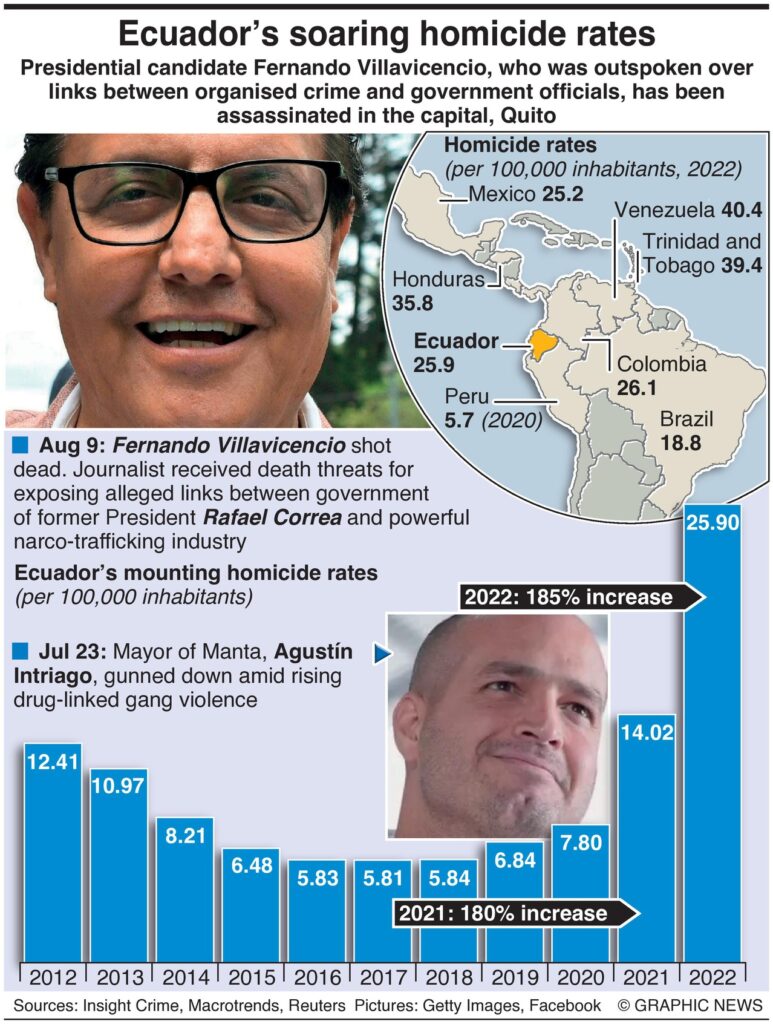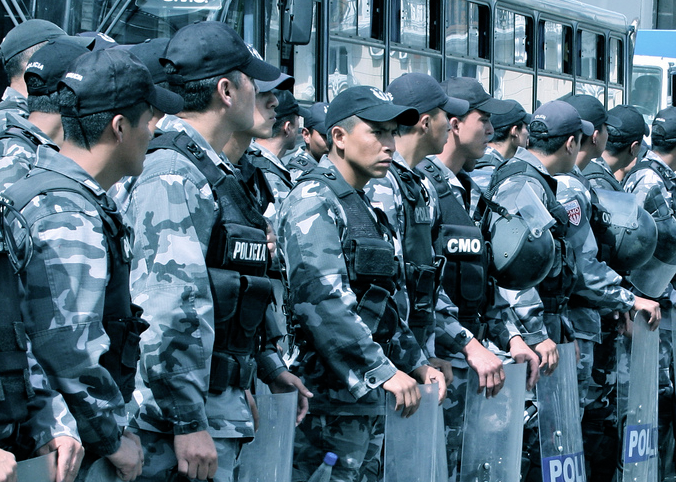ANALYSIS – Is it becoming a ‘failed state?' Stuck between two major cocaine producers, Ecuador, which does not produce the drug, is getting squeezed by organized crime groups from both sides, as well as Mexican cartels.
And now, outspoken anti-corruption presidential candidate Fernando Villavicencio, 59, is the latest high-profile victim.
It was the first assassination of a presidential candidate in Ecuador, once a relatively safe nation, and comes less than three weeks after Agustín Intriago, mayor of Manta, a port city, was also killed during a public appearance.
Villavicencio, a former journalist who was outspoken over links between organized crime and government officials, was shot and killed outside a school in the capital Quito, following a campaign rally ten days before the first round of the presidential election.
The gunman died in police custody following an exchange of fire with security personnel. Nine other people were shot and injured.

The six suspects arrested in connection with the assassination of are Colombian nationals.
The revelation that the suspects are Colombian is reminiscent of the assassination of Haiti's president, Jovenel Moïse, in July 2021, in a plot that ensnared at least 18 Colombians who remain jailed in Haiti awaiting trial. The Colombians are accused of assisting in the operation to kill the Haitian leader in his home.
While polling near the middle of an eight-person race, Villavicencio was among the most vocal candidates on the issue of crime and state corruption.
“I think that what is going to change is the way we conceive of politics. I think that from now on it becomes a high-risk profession,” said Arianna Tanca, an Ecuadorian political scientist.
Though Ecuador does not produce cocaine, nor its main ingredient, coca, it sits between two massive narcotics production hotspots – Colombia and Peru – and now has South America's fastest-rising homicide rate.
The New York Times added:
Ecuador, on South America's western edge, witnessed an extraordinary transformation between 2005 and 2015 as millions of people rose out of poverty, riding the wave of an oil boom whose profits were poured into education, health care and other social programs.
But more recently, the country has been dominated by an increasingly powerful narco-trafficking industry. Foreign drug mafias have joined forces with local prison and street gangs, unleashing a wave of violence unlike anything in the country's recent history. Homicide rates are at record levels.
Today, the violence is often horrific and public, meant to induce fear and exert control: There are regular reports of car bombings, beheadings and children being gunned down outside their schools.
Several factors triggered Ecuador's rise in organized crime. In 2016, Colombia's government signed a peace deal with the FARC, which ended the guerrilla group's five-decade insurgency.
The FARC had created cocaine trafficking routes from Colombia to Ecuador's Pacific ports. The peace deal opened a power vacuum in which Ecuadorian groups began to battle for control of the cocaine routes.
Foreign criminal groups also followed suit. Mexico's Sinaloa and Jalisco cartels recruited local proxies in Ecuador, and the Albanian mafia – which had long helped the FARC ship its cocaine to Europe – established a presence of its own in the country.
Referring to the assassination, former President Rafael Correa, who served from 2007 to 2017 and still holds major political sway in the country said: “Ecuador has become a failed state.”
However, as a journalist, Villavicencio often wrote about alleged corruption in the Correa government, provoking legal persecution and even death threats.
Ecuador may have started failing long before now.
The opinions expressed in this article are those of the author and do not necessarily reflect the positions of American Liberty News.
READ NEXT: Tech Giants Musk And Zuckerberg Set To Face Off In Cage Match



They can strike anyplace anytime
Have you ever thought about posting on job search sites instead of here? Nobody here is looking for a job right now.
Have you ever thought about posting on job search sites instead of here? Nobody here is looking for a job right now.
If our loony left liberal war-mongers in D.C. want to go to war with someone, why can’t they make it against the cartels?
I suppose maybe the cartels are some of their biggest donors?
They are. Do you think Plato or Plomo stops at the border?
The DNC is sooo impressed!